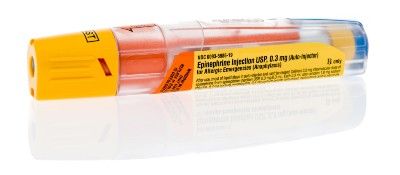Top Class Actions’s website and social media posts use affiliate links. If you make a purchase using such links, we may receive a commission, but it will not result in any additional charges to you. Please review our Affiliate Link Disclosure for more information.
In recent legal news, EpiPen manufacturers face a class action lawsuit alleging that the life-saving products have misleading expiration dates.
Plaintiff Shawn Carstensen Hays claims Pfizer Inc. and its subsidiary Meridian Medical Technologies Inc., two manufacturers of the widely used EpiPen, intentionally mislead consumers by using false expiration dates.
As a result of this scheme, consumers are allegedly deceived into refilling their EpiPen prescription when the product is still safe to use.
“From this scheme to defraud, Defendants have caused at least hundreds of millions of dollars of excess purchases every year, year after year, for over the last decade,” the EpiPen class action lawsuit claims.
An EpiPen is a brand-name injectable medication that can help save someone if they’re experiencing a life-threatening allergic reaction known as anaphylaxis.
Anaphylaxis causes the immune system to release a rush of chemicals in response to an allergen, and this immune response can send a person into shock. Although the most well-known anaphylaxis symptom is narrowing airways, anaphylaxis can also cause low blood pressure, rashes, a weak pulse, nausea and vomiting.
EpiPen products contain epinephrine, which helps stop the allergic reaction so the user can get medical care immediately. Without an EpiPen, anaphylaxis can quickly prove fatal.

Unfortunately, according to Hays’ class action lawsuit, EpiPen manufacturers take advantage of this by deceiving patients into prematurely renewing their prescriptions.
Since November 2010, Pfizer and Meridian have allegedly worked with marketing company Mylan to manipulate expiration dates by putting a shorted expiration period on the products than is medically necessary.
According to the EpiPen class action lawsuit, these 12- to 18-month expiration periods are not supported by medical literature nor the data and studies provided to the U.S. Food and Drug Administration.
To make these artificially shortened expiration periods worse, the defendants have allegedly encouraged consumers to renew EpiPen prescriptions every year during the “back to school” retail season. These unnecessary purchases were reportedly encouraged by misleading and manipulative marketing programs.
“Combined, these features of the epinephrine auto-injector market mean Pfizer and Mylan have been able to rake in hundreds of millions of dollars in excess profits as a result of the EpiPen Expiration Scheme,” the EpiPen class action lawsuit contends. “But for the scheme to defraud, this money would not have flowed in.”
In August 2018, the scheme was allegedly revealed amidst a countrywide epinephrine auto-injector shortage during the back to school season.
As a result of this shortage, the FDA extended the shelf life of various EpiPen products by four months “based on stability data provided by Mylan and reviewed by the FDA.” At the same time, Pfizer and Mylan reportedly released a statement that “[t]his announcement is based on a careful review of product stability data provided by Pfizer.”
Hays says this act caught the company in a lie since the EpiPens “suddenly gained a longer shelf life” without any real changes to the product, device or medication within. Instead, this extension allegedly demonstrated that the existing formulation had a longer shelf life than was advertised by the manufacturers.
“That Defendants and Mylan could suddenly expand the expiration date proves the fraud scheme and confirms that the ‘temporary’ expiration date should have been (at a minimum) the ‘permanent’ expiration date all along, for all lots of EpiPens,” the EpiPen class action lawsuit claims.
“If the longer expiration date was unsafe, the FDA never would (or could) have approved it — temporarily or otherwise.”
The companies have allegedly continued to deceptively market their EpiPen products, even with the true shelf life of the products revealed.
According to Hays, the companies continue to manufacture EpiPens with reduced expiration dates, only to later request 12-month extensions of various lots.
The EpiPen class action lawsuit argues that companies have the data to approve a permanent extension of expiration dates, but choose not to in order to continue their scheme.
Hays argues that the defendants’ conduct violates the Racketeering and Corrupt Practices Act (RICO) and seeks to represent a Class of consumers who purchased an EpiPen refill within 36 months of purchasing an earlier EpiPen product since Nov. 1, 2010.
Do you use an EpiPen? Are you worried about the expiration date on your product? Share your thoughts in the comment section below.
Hays and the proposed Class are represented by Daniel A. Lipman of Parker Lipman LLP.
The EpiPen Class Action Lawsuit is Shawn Carstensen Hays v. Pfizer Inc., et al., Case No. 1:20-cv-01948, in the U.S. District Court for the District of Colorado.
Read About More Class Action Lawsuits & Class Action Settlements:
Cancer Medications Thalomid & Revlimid Class Action Settlement
Valsartan Blood Pressure Medication May Increase COVID-19 Risks
Sex Trafficking Survivor Appointed to U.S. Advisory Council on Human Trafficking
ATTORNEY ADVERTISING
Top Class Actions is a Proud Member of the American Bar Association
LEGAL INFORMATION IS NOT LEGAL ADVICE
Top Class Actions Legal Statement
©2008 – 2024 Top Class Actions® LLC
Various Trademarks held by their respective owners
This website is not intended for viewing or usage by European Union citizens.
















357 thoughts onEpiPen Class Action Lawsuit Alleges Fake Expiration Dates
My son had an epi pen for years. Please add me.